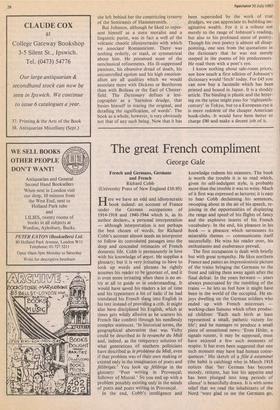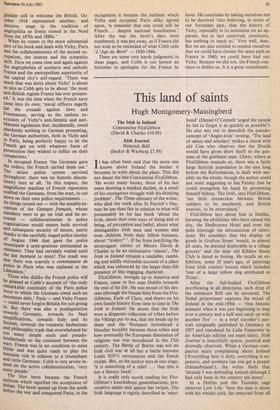The great French compliment
George Gale
French and Germans, Germans and French Richard Cobb (University Press of New England £10.95)
Here we have an odd and idiosyncratic book indeed: an account of France under the German occupations of 1914-1918 and 1940-1944 which is, as its author declares, a personal interpretation — although interpretation is not perhaps the best chosen of words, for Richard Cobb's account almost needs an interpreter to follow its convoluted passages into the deep and concealed intimacies of French domestic life. Cobb is permanently in love with his knowledge of argot. He supplies a glossary; but it is very irritating to have to look up words and phrases he rightly assumes his reader to be ignorant of, and it is even more irritating when there is no en- try at all to guide us in understanding. It would have saved his readers a lot of time and his typesetters a lot of italic if he had translated his French slang into English in his text instead of providing a crib. It might also have disciplined his English, which at times gets wildly allusive as he scatters his French like confetti through his needlessly complex sentences. 'In historical terms, the geographical aberration that was Vichy could be described as la revanche du Midi and, indeed, as the temporary solution of what generations of southern politicians have described as le probleme du Midi, even if that problem was of their own making or existed only in the imagination of poets and felibriges.' You look up felibrige in the glossary: 'Poet writing in Provencal; follower of Mistral.' So you end up with a problem possibly existing only in the minds of poets and poets writing in Provencal.
In the end, Cobb's intelligence and
knowledge redeem his manners. The book is worth the trouble it is to read which, given its self-indulgent style, is probably more than the trouble it was to write. Much of it first was expressed as lectures; it is easy to hear Cobb declaiming his sentences, swooping about in the air of his speech, re- joicing in the opportunities of displaying the range and speed' of his flights of fancy and the explosive inserts of his French vocabulary. In the end, his pleasure in his book — a pleasure which surmounts its miserable themes — communicates itself successfully. He wins his reader over, his enthusiasms and exuberance prevail.
The first occupation is dealt with briefly but with great sympathy. He likes northern France and paints an impressionistic picture of the trains bringing the Germans to the front and taking them away again after the final defeat. In the years between — years always punctuated by the rumbling of the trains — he lets us feel how it might have been in the world of the occupied. He en- joys dwelling on the German soldiers who ended up with French mistresses working-class liaisons which often produc- ed children: 'Each such birth at least represented a small, pathetic victory for life'; and he manages to produce a small piece of sensational news: 'Even Hitler, a signals runner, it may be supposed, must have enjoyed a few such moments of respite. It has even been suggested that one such moment may have had human conse- quences.' His sketch of a file a estaminet (the habit is catching) who in March 1918 notices that 'her German has become moody, reticent, has lost his appetite and has been plunged into long periods of silence' is beautifully drawn. It is with some relief that we read the inhabitants of the Nord 'were glad to see the Germans go,
gladder still to welcome the British. Oc- tober 1918 represented another, and decisive, stage in the tradition of anglophilia so firmly rooted in the Nord from the 1870s and 1880s.'
When he comes to the more substantial Part of his book and deals with Vichy, Paris and the collaborationists of the second oc- cupation, the interest and the sympathy shift. Here we come time and again against the anglophobia of southern and catholic France and the metropolitan superiority of the capital city's self-regard. 'There was much that was dotty about Vichy' is about
as nice as Cobb gets to be about 'the most anti-British regime France has ever possess-
ed.' It was the time when the French navy came into its own: 'naval officers eagerly led the crusade against Jews and Freemasons, serving as the zealous ex- ecutants of Vichy's anti-Semitic and anti- Masonic legislation that, incidentally, owed absolutely nothing to German prompting, the German authorities, both in Vichy and in Paris, being perfectly happy to let the
French get on with whatever form of persecution they wished to inflict on their compatriots.'
In occupied France 'the Germans gave the orders; the French carried them out.' The entire police system survived throughout: there was no historic discon- tinuity here at all. 'In this respect, the magnificent machine of French repression enabled the Germans, from the start, to cut down on their own police requirements ...
As things turned out — with the notable ex- ception of the Gestapo francais, whose
members were to go on trial and be ex-
ecuted — collaborationism in police organisations would ensure both survival
and subsequent security of tenure, partly
thanks to the carefully staged police mutiny of August 1944 that gave the police tnunicipale a semi-spurious testimonial as resistants. They had certainly waited until the last moment to resist! The result was that there was scarcely a commissaire de Police in Paris who was replaced at the Liberation.'
Those who dislike the French police will be Pleased at Cobb's account of 'the truly
remarkable continuity of the Paris police
force to which the Germans owed such an enormous debt.' Paris — and Vichy France — could never forgive Britain for not giving in• But there was also a predisposition towards Germany, towards its Nazi
simplifications, towards Italy and its
fascism, towards the romantic barbarisms and philosophic trash that overwhelmed far too many simple souls and pseudo-
intellectuals on the continent between the Wars. France was in no condition to resist
Hitler and was quite ready to play the feminine role in relation to a triumphant and virile Germany. Cobb is very severe in- deed on the active collaborationists, 'very nasty People.' The blue beret became the French uniform which signified the acceptance of defeat. The beret spread up from the south before the war and conquered Paris; in the
occupation it became the emblem which Vichy and occupied Paris alike agreed upon, 'a reminder that one could still be French... despite national humiliation.' After the war the beret's days were numbered; it was put away, as if France did not wish to be reminded of what Cobb calls L'Age du Beret' — 1930-1944.
There are some very harsh judgments in these pages, and Cobb is too honest an historian to apologise for the France he loves. He concludes by asking ourselves not to be deceived 'into believing, in terms of our fortunate past, that the history of Vichy, especially in its insistance on an ap- parent, but in fact contrived, continuity, has nothing to teach us.' Very well, then. But we are also entitled to remind ourselves that we could have chosen the same path as France in 1940; we could have had our Vichy. Because we did not, the French con- tinue to dislike us. It is a great compliment.







































 Previous page
Previous page